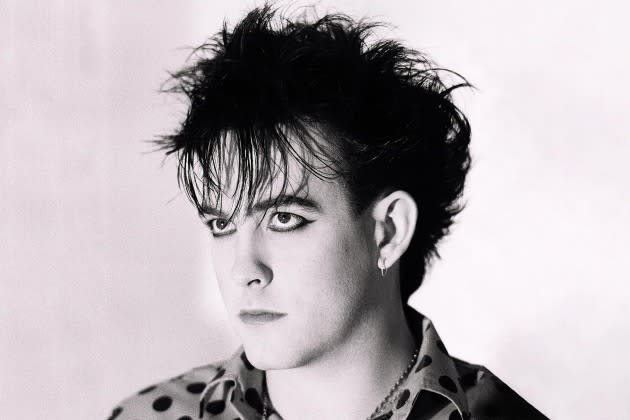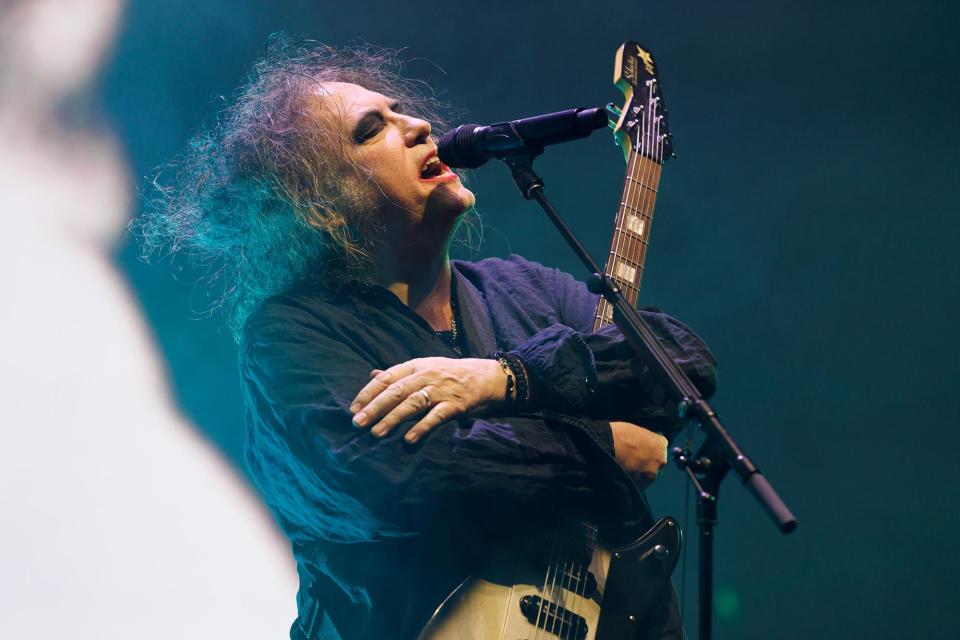The Cure Are This Summer’s Hottest Rock Tour. Yes, Really

There’s something so beautifully weird about the triumphant return of the Cure. It’s a crazy moment for fans — of all the fandoms in pop history, this is one of the most bizarrely long-lived, open-ended, multigenerational, cheerfully unkillable. Robert Smith and his crew of English gloom gods are hitting the road all summer, introducing music from their long-awaited album, Songs From a Lost World, which is so long-awaited it still doesn’t exist. The summer’s biggest rock tour is the goth-moppet lover boy who sang “Boys Don’t Cry” more than 40 years ago? That’s a future nobody would have predicted for this band — not even Smith.
But nobody even hates the Cure anymore, which once seemed like a crucial part of the fandom’s identity. Smith has never lost his aura of bemused angst, with his dripping gobs of eyeliner, his smeared red lipstick, his sticky black-bat swamp of hair. He always gives the vibe of a mischievous toddler who just got caught playing with mother’s makeup. For a tortured genius who used to be one of the most divisive figures in music, he really thrives in the role of a universally cherished elder, everybody’s favorite eccentric goth auntie. Strange as angels, perfect as cats, but always himself.
More from Rolling Stone
Riot Fest 2023: How to Find Tickets to See Foo Fighters, The Cure
See the Cure Revive 'A Thousand Hours,' 'Six Different Ways' Live for First Time Since 1987
He’s touring the U.S. at the same time that his old friend and bandmate Siouxsie Sioux is doing her first shows in a decade. Throw in the Love and Rockets reunion, and you’ve got a hell of an undead summer for gothic icons. It might feel like a paradox to stand in an arena full of strangers, singing about soul-crushing loneliness, but that’s the essence of being a Cure freak. It’s been 15 years since their last album, yet this music is timeless. The band that gave the world Disintegration is the band that will never, ever disintegrate.
The last time he dropped new music, on 2004’s (kinda great) The Cure and 2008’s (kinda not) 4:13 Dream, he was going for concise pop. But the Lost World material is darker, heavier. The six-piece Cure has evolved into a black nail-polish jam-band monster, playing marathon shows stuffed to the nipples with deep cuts. They toured Europe last year, debuting five tunes from Lost World, like the powerful “Endsong” and the astounding show-stopper “Alone.” It builds for nearly ten space-rock minutes, as Smith wails, “No hopes, no dreams, no world/No, I don’t belong here anymore.” He signs off with the farewell, “Left with nothing at the end of every song.”
Smith has spent years promising the new album is almost done, any day now, honest. (“It’ll be worth the wait,” he said last year backstage at a London awards show. “I think [it’s] the best thing we’ve done, but then I would say that.”) That’s something diehard fans have come to expect. As he told Rolling Stone the last time he released new music, back in 2008, “I like the sound of deadlines as they rush past my head.” He always makes us wait, he always promises it’s his best ever, and he always vows it’s the last one he’ll ever make. A few years ago, he said this one will be like Disintegration, except without songs that “lighten the mood,” and he didn’t even mean it as a joke.

Longevity didn’t really seem like it was in the cards for this band. By the time the Cure released their 1986 greatest-hits album, Standing on a Beach, one scholar calculated that Robert Smith had already died 74 times in his lyrics. It already seemed strange that these Three Imaginary Boys had lasted so long, especially since the high-strung frontman was always threatening to quit music. As he said in 1996, “I will be 40 years old in April ’99, and I think it will be awful to enter a new millennium still in a band called the Cure. I just can’t see myself doing it. I would be horrified.” On the cusp of his birthday, he wrote a song called “39,” moaning, “The fire is almost out, and there’s nothing left to burn.” But as it turned out, he wasn’t even halfway done. This guy never stops. It takes a really twisted kind of obsession to sing “I wish I’d stayed asleep today” every night for four decades.
He originally made his bones with gloom soufflés like Faith, Pornography, and Seventeen Seconds. But then he chose to open up the music. He’s never been the kind of rocker who pretends he didn’t want to get famous. “I decided to be a pop star,” he told Rolling Stone in 2004. “It’s so ludicrous that I’m gonna go from goth idol to pop star in three easy lessons.” He nailed it on the first try, with 1982’s “Let’s Go to Bed,” a brilliant synth-pop groove about a couple staying up all night to bond about how miserable they are. “Suddenly ‘Let’s Go to Bed’ was turning into a big hit, on the West Coast particularly, and we had a young, predominately female, teenage audience,” he continued. “It went from intense, menacing, psychotic goths to people with perfect white teeth. It was a very weird transition, but I enjoyed it. I thought it was really funny.”
This tour has brought out his fighting side, which we hardly ever see. He’s one of the very, very few bankable stars to speak out about Ticketmaster and the absolute hellhole that the concert-ticket racket has become for fans. He kept ticket prices low for this tour, resisting the bait-and-switch scam of “dynamic pricing,” only to see Ticketmaster double the cost with their added fees. He declared, “I am as sickened as you all are by today’s Ticketmaster ‘fees’ debacle.” He got a minimal refund for fans — but there’s something touching about his willingness to get his hands dirty here.
One of the eternal riddles for fans: How can Smith reign as rock’s ultimate troubadour of romantic despair when he’s been happily married for decades to his childhood sweetheart? But that’s one of the artistic masks he wears, like his makeup. As he said back in the 1990s, “The notion that people have of me, that I’m not a grown-up, I live in this imaginary world and wander about London in pajamas quoting Baudelaire, is not true.” (He went on to explain that it’s untrue because he lives by the sea, not London. “Now I march briskly up and down the beach quoting Baudelaire at the waves!” This is why he is Robert Smith.)
“I could die tonight of a broken heart,” he sings on one of the new songs, “A Fragile Thing,” although, as Al Pacino would say in The Godfather Part II, he’s been dying of the same broken heart for years now. He does end up solitary in most songs — especially “Just Like Heaven,” his most famous hit, a wedding banger despite the fact that it’s a love story with an impossibly sad ending, leaving Robert stuck in his alone-alone-alone misery. But somehow the emotional destruction still feels cathartic. If that’s a contradiction, it’s one where Cure fans feel right at home.
Best of Rolling Stone

